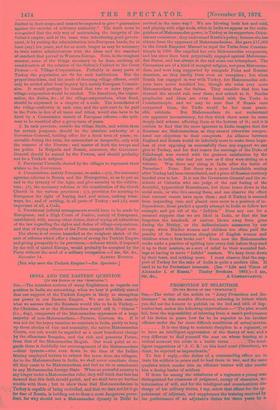INDIA AND THE EASTERN QUESTION.
[TO THE EDITOR OF TER " SPECTATOR:]
SIR,—The mistaken notions of many Englishmen as regards our position in India are astonishing, when we hear it publicly stated that our support of the Turkish Empire is likely to strengthen our power in our Eastern Empire. We are in India exactly what we assume that the Russians would like to be in Turkey,— the Christian, or as the Mahommedans would call it, " Giaour " (i.e., dog), conquerors of the Mahommedan oppressors of a large majority of non-Mahommedans,—Parsees, Gentoos, &c. If it was not for the heavy taxation we maintain in India, partly to keep up those abodes of vice and sensuality, the native Mahommedan Courts, our rule would be regarded as a most beneficent change by the effeminate Bengalee, and the rich and generous Parsee, from that of the Mahommedan Moguls. Our weak point as re- gards them is decidedly our encouragement of the Mahommedans —their tyrants—who even down to the time of the Indian Mutiny employed torture to extract the taxes from the villagers. As to the Mahommedans in India, we shall never conciliate them till they cease to be Mahommedans, and feel no tie or attachment to any Mohammedan foreign State. When no powerful country is any longer under a Mahommedan ruler, they will think that fate has decreed that this faith should perish, and we shall have no further trouble with them ; but to show them that Mahommedanism in Turkey is capable of being revivified, and that we dare not let it go for fear of Russia, is holding out to them a most dangerous prece- dent, for why should not a Mahommedan dynasty in Delhi be
revived in the same way ? We are blowing both hot and cold, and playing with edge-tools, when in India we appear as the extin- guishers of Mahommedan power, in Turkey as its supporters. Orien- tals are consistent; they understand Russia's policy, because she has. always been the opponent of Mahommedanism. She gave £17,000 to the Greek Emperor Manuel to repel the Turks from Constan- tinople in 1398. She expelled her own Mahommedan conquerors, and has since then been perpetually engaged against Mahomme- dan States, and has always in the end come out triumphant. The Caucasians are of a kind of mongrel religion, not pure Mahomme- dans, and were long supported by renegade Poles and Russian deserters, so they hardly form even an exception ; but when Russia has engaged in war with Turkey, her Mahommedan sub- jects have never troubled her, though she rules over more Mahommedans than the Sultan. They consider that fate has decreed she should rule over them, and submit to it. Similar prophecies and ideas are even found with the Turks in Constantinople, and we may be sure that if Russia once conquered them, the Turks would be her most peace- able subjects. But Mahommedans do not understand our apparent inconsistency, for they think there must be some deeply-laid scheme affecting them at the bottom of it; and it is curious to find that the more ignorant in India imagine that the Russians are Mahommedans, as they cannot otherwise compre- hend our objection to their conquests. An affiance between England and Russia would do infinitely more to make them hope- less of ever opposing us successfully than any support we can give to Turkey, and for that reason the marriage of the Duke of Edinburgh was viewed with the greatest satisfaction by the English in India, who feel just now as if they were sitting on a. volcano. Was there any rising in India after the battle of Navarino ? None. But there was a most formidable mutiny after Turkey had been resuscitated, and a piece of Russian territory handed over to her. It is not the Governors-General and the re- sidents at Calcutta who can judge of the real feeling of the deceitful, hypocritical Mussulmans, but those lower down in the social scale, or who live among them, and can observe the effect that current events have upon them ; and if Turkey is rescued from impending ruin and placed once more in a position of in- dependence, these predict a speedy attempt in India to follow her example, and get rid of the "Infidels." Does any one for a moment suppose that we are liked in India, or that she has forgotten the hundreds of natives blown away from guns during the Mutiny, or the indiscriminate massacres by our troops, when Hindoo women and children too often paid the penalty of the treacherous slaughter of English women and children when it first broke out? Even now the Mahommedan cooks make a practice of spitting into every dish before they send it up to their masters, as a sort of relief to their wounded feel- ings at having to serve "Infidel" masters. We keep them down by their fears, and nothing more. I must observe that the sup- port of Turkey for the sake of India is quite a modern idea. It used to be for Protestant interests. (See "Life and Times of Alexander I. of Russia." Tinsley Brothers. 1875)-1 am,






































 Previous page
Previous page